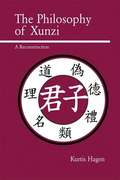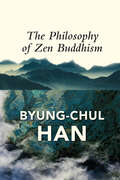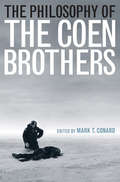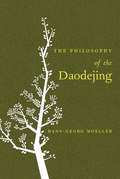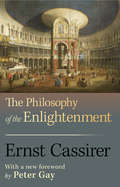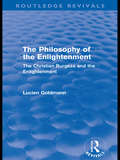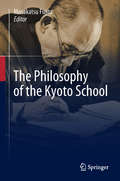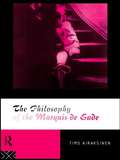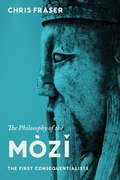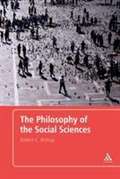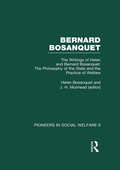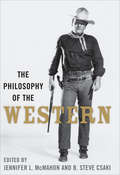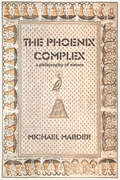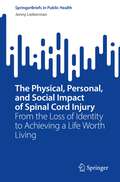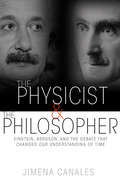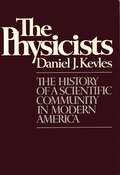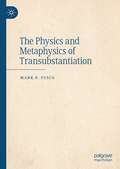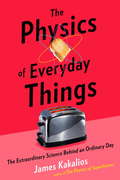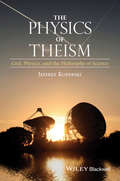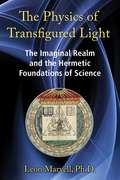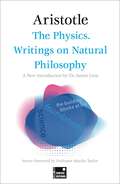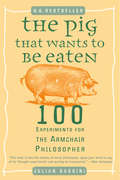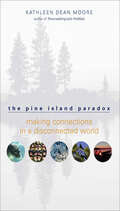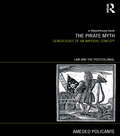- Table View
- List View
The Philosophy of Xunzi: A Reconstruction
by Kurtis Hagen<i>The Philosophy of Xunzi</i> sheds light on the teachings of a disciplined thinker who contradicted conventional schools of Confucian thought. Living in a time of great instability and discord, Xunzi came to believe that man’s desires, if left unchecked, would lead to ruin, and so advocated a system of strict societal controls. His best-known disciple took a more extreme stance, likely coloring history’s view of Xunzi. This new examination of his complex, sometimes harsh ideas, uncovers a deeper humanity and a restrained optimism in his writings, giving them new relevance for present-day Confucians and Western thinkers.
The Philosophy of Zen Buddhism
by Byung-Chul HanZen Buddhism is a form of Mahāyāna Buddhism that originated in China and is strongly focused on meditation. It is characteristically sceptical towards language and distrustful of conceptual thought, which explains why Zen Buddhist sayings are so enigmatic and succinct. But despite Zen Buddhism&’s hostility towards theory and discourse, it is possible to reflect philosophically on Zen Buddhism and bring out its philosophical insights. In this short book, Byung-Chul Han seeks to unfold the philosophical force inherent in Zen Buddhism, delving into the foundations of Far Eastern thought to which Zen Buddhism is indebted. Han does this comparatively by confronting and contrasting the insights of Zen Buddhism with the philosophies of Plato, Leibniz, Fichte, Hegel, Schopenhauer, Nietzsche, Kierkegaard, Heidegger and others, showing that Zen Buddhism and Western philosophy have very different ways of understanding religion, subjectivity, emptiness, friendliness and death. This important work by one of the most widely read philosophers and cultural theorists of our time will be of great value to anyone interested in comparative philosophy and religion.
The Philosophy of the Coen Brothers (The Philosophy of Popular Culture #Ppcs)
by Mark T. Conard&“Written for both fans of the Coen brothers and the philosophically curious, without the technical language . . . educational and entertaining.&” —Library Journal Joel and Ethan Coen have made films that redefined the gangster movie, the screwball comedy, the fable, and the film noir, but no matter what genre they&’re playing with, they consistently focus on the struggles of complex characters to understand themselves and their places in the strange worlds they inhabit. To borrow a phrase from Barton Fink, all Coen films explore &“the life of the mind&” and show that the human condition can often be simultaneously comic and tragic, profound and absurd. The essays in this book explore the challenging moral and philosophical terrain of the Coen repertoire. Several address how Coen films often share film noir&’s essential philosophical assumptions: power corrupts, evil is real, and human control of fate is an illusion. In Fargo, not even Minnesota&’s blankets of snow can hide Jerry Lundegaard&’s crimes or brighten his long, dark night of the soul. The tale of love, marriage, betrayal, and divorce in Intolerable Cruelty transcends the plight of the characters to illuminate competing theories of justice. Even in lighter fare, such as Raising Arizona and The Big Lebowski, the comedy emerges from characters&’ journeys to the brink of an amoral abyss. However, the Coens often knowingly and gleefully subvert conventions and occasionally offer symbolic rebirths and other hopeful outcomes. At the end of The Big Lebowski, for example, the Dude abides, his laziness has become a virtue, and the human comedy is perpetuating itself with the promised arrival of a newborn Lebowski. The Philosophy of the Coen Brothers sheds new light on the work of these cinematic visionaries. From Blood Simple to No Country for Old Men, the Coens&’ characters look for answers—though in some cases, their quest for answers leads, at best, only to more questions.
The Philosophy of the Daodejing: The New, Highly Readable Translation Of The Life-changing Ancient Scripture Formerly Known As The Tao Te Ching (Philosophy)
by Hans-Georg MoellerFor centuries, the ancient Chinese philosophical text the Daodejing (Tao Te Ching) has fascinated and frustrated its readers. While it offers a wealth of rich philosophical insights concerning the cultivation of one's body and attaining one's proper place within nature and the cosmos, its teachings and structure can be enigmatic and obscure. Hans-Georg Moeller presents a clear and coherent description and analysis of this vaguely understood Chinese classic. He explores the recurring images and ideas that shape the work and offers a variety of useful approaches to understanding and appreciating this canonical text. Moeller expounds on the core philosophical issues addressed in the Daodejing, clarifying such crucial concepts as Yin and Yang and Dao and De. He explains its teachings on a variety of subjects, including sexuality, ethics, desire, cosmology, human nature, the emotions, time, death, and the death penalty. The Daodejing also offers a distinctive ideal of social order and political leadership and presents a philosophy of war and peace.An illuminating exploration, The Daodejing is an interesting foil to the philosophical outlook of Western humanism and contains surprising parallels between its teachings and nontraditional contemporary philosophies.
The Philosophy of the Enlightenment
by Ernst Cassirer Peter GayThe present book aims to be both more and less than a monograph on the philosophy of the Enlightenment. It is much less, for the primary task of such a monograph would be to offer the reader a wealth of detail and to trace the genesis and development of all the special problems of this philosophy.
The Philosophy of the Enlightenment: The Christian Burgess and the Enlightenment (Routledge Revivals)
by Lucien GoldmannIn this reissue, originally published in English in 1973, French philosopher Lucien Goldmann turns his attention to the Enlightenment of the eighteenth century, the great age of liberalism and individualism and analyses the ‘mental structures’ of the outlook of the philosophes, who showed that the ancien regime and the privileges of the Church were irrational anachronisms. In assessing the strengths and limitations of individualism, Goldmann considers the achievements and limitations of the Enlightenment. He discusses the views of Hegel and Marx and examines the relation between liberal scepticism and traditional Christianity to point the way to the possible reconciliation of the two seemingly incompatible ‘world visions’ of East and West today.
The Philosophy of the Kyoto School
by Masakatsu FujitaThe main purpose of this book is to offer to philosophers and students abroad who show a great interest in Japanese philosophy and the philosophy of the Kyoto school major texts of the leading philosophers. This interest has surely developed out of a desire to obtain from the thought of these philosophers, who stood within the interstice between East and West, a clue to reassessing the issues of philosophy from the ground up or to drawing new creative possibilities.The present condition seems to be, however, that the material made available to further realize this kind of intellectual dialogue is far too scarce. This book is intended to be of some help in this regard.The book presents selected texts of representative philosophers of the Kyoto school such as Nishida Kitaro, Tanabe Hajime, Miki Kiyoshi, Nishitani Keiji, and others who best illustrate the characteristics of this school, and works that together portray its image as a whole. Those who are interested in Japanese philosophy or specifically the philosophy of the Kyoto School can survey a comprehensive representation from this book.These texts are, of course, quite difficult and cannot be well understood without sufficient preliminary knowledge. Expository essays have therefore been included after each text to provide guidance. In each of these commentaries a scholar of our time with deep understanding of the philosopher in question has provided an account of his life, intellectual journey, and the significance of the text included here.From this book will emerge a new dialogue of ideas that in turn will engender new developments in philosophy, thereby further expanding the network of philosophical thought worldwide.
The Philosophy of the Marquis de Sade
by Timo AiraksinenThe Marquis de Sade is famous for his forbidden novels like Justine, Juliette, and the 120 Days of Sodom. Yet, despite Sade's immense influence on philosophy and literature, his work remains relatively unknown. His novels are too long, repetitive, and violent. At last in The Philosophy of the Marquis de Sade, a distinguished philosopher provides a theoretical reading of Sade. Airaksinen examines Sade's claim that in order to be happy and free we must do evil things. He discusses the motivations of the typical Sadean hero, who leads a life filled with perverted and extreme pleasures, such as stealing, murder, rape, and blasphemy. Secondary sources on Sade, such as Hobbes, Erasmusm, and Brillat-Savarin are analyzed, and modern studies are evaluated. The Philosophy of the Marquis de Sade greatly enhances our understanding of Sade and his philosophy of pain and perversion.
The Philosophy of the Mòzi: The First Consequentialists
by Chris FraserMohism was an ancient Chinese philosophical movement founded in the fifth century BCE by the charismatic artisan Mòzi, or "Master Mo." Its practitioners advanced a consequentialist ethics, along with fascinating political, logical, and epistemological theories, that set the terms of philosophical argumentation and reflection in China for generations to come. Mohism faded away in the imperial era, leaving the impression that it was not as vital as other Chinese philosophical traditions, yet a complete understanding of Confucianism or Daoism is impossible without appreciating the seminal contribution of Mohist thought.The Philosophy of the Mòzi is an extensive study of Mohism, situating the movement's rise and decline within Chinese history. The book also emphasizes Mohism's relevance to modern systems of thought. Mohism anticipated Western utilitarianism by more than two thousand years. Its political theory is the earliest to outline a just war doctrine and locate the origins of government in a state of nature. Its epistemology, logic, and psychology provide compelling alternatives to contemporary Western mentalism. More than a straightforward account of Mohist principles and practice, this volume immerses readers in the Mohist mindset and clarifies its underpinning of Chinese philosophical discourse.
The Philosophy of the Mòzĭ: The First Consequentialists
by Chris FraserMohism was an ancient Chinese philosophical movement founded in the fifth century BCE by the charismatic artisan Mòzi, or "Master Mo." Its practitioners advanced a consequentialist ethics, along with fascinating political, logical, and epistemological theories, that set the terms of philosophical argumentation and reflection in China for generations to come. Mohism faded away in the imperial era, leaving the impression that it was not as vital as other Chinese philosophical traditions, yet a complete understanding of Confucianism or Daoism is impossible without appreciating the seminal contribution of Mohist thought. The Philosophy of the Mòzi is an extensive study of Mohism, situating the movement's rise and decline within Chinese history. The book also emphasizes Mohism's relevance to modern systems of thought. Mohism anticipated Western utilitarianism by more than two thousand years. Its political theory is the earliest to outline a just war doctrine and locate the origins of government in a state of nature. Its epistemology, logic, and psychology provide compelling alternatives to contemporary Western mentalism. More than a straightforward account of Mohist principles and practice, this volume immerses readers in the Mohist mindset and clarifies its underpinning of Chinese philosophical discourse.
The Philosophy of the Social Sciences: An Introduction
by Robert BishopThe book not only offers lucid and incisive coverage of the philosophy of the social sciences, but also extends the major debates and considers the latest directions in this growing area of philosophical interest. Robert C. Bishop's cogent and rigorous analysis is supplemented by useful pedagogical features, including key examples from philosophical writing; summaries of core debates; sample questions and exercises; and guides for further reading.
The Philosophy of the State and the Practice of Welfare: The Writings of Bernard and Helen Bosanquet
by David Gladstone J. H. Muirhead Helen BosanquetUnemployment, poverty and the role of the state were themes which structured the discourse of social theory and the developing social legislation in Britain at the end of the Victorian period and the early twentieth century. This collection examines the neglected contribution of Bernard and Helen Bosanquet to that contemporary maelstrom of ideas about the condition of the people, the process of social reform and the practice of social work. Like their contemporaries Sidney and Beatrice Webb, the Bosanquets were a significant partnership integrating philosophy and practice, theory and action. Bernard Bosanquet, the Idealist philosopher, is best known for his study The Philosophical Theory of the State. His wife Helen, economist and social worker, was a member of the Royal Commission on the Poor Laws (1905-9) and between 1909 and 1921, editor of the Charity Organisation Review. Themselves selective supporters of state welfare schemes, they helped to re-fashion the Charity Organisation Society away from its nineteenth century individualism by their advocacy of organic social collectivism. But character, self development and responsibility remained central tenets of their welfare programme. This collection re-publishes most of the Bosanquets' principal books and articles relating to the philosophy of the state and the practice of welfare. The development of their ideas in the context of their own time, and their relevance to current debates in the theory and practice of welfare, forms the basis of a substantial introduction by David Gladstone, the series editor. This Volume charts the life of Bernard Bosanquet.
The Philosophy of the Western (The Philosophy of Popular Culture #Ppcs)
by Jennifer L. McMahon and B. Steve CsakiEssays about how stories of the Old West reflect—and affect—our beliefs and values.The solitude of the lone rider, the loyalty of his horse, and the unspoken code of the West—for many, Western movies embody America and its values, though the view of the country&’s history they present isn&’t always accurate. In recent years, scholars had declared the genre dead, but a steady resurgence of western themes in literature, film, and television has reestablished its importance and influence.In The Philosophy of the Western, editors Jennifer L. McMahon and B. Steve Csaki examine philosophical themes in the western genre. Investigating subjects of nature, ethics, identity, gender, environmentalism, and animal rights, the essays in this volume draw from a wide range of westerns including the more recent popular and critical successes Unforgiven, All the Pretty Horses, 3:10 to Yuma, and No Country for Old Men, as well as literature and television serials such as Deadwood. The Philosophy of the Western reveals the powerful role of the western in the American psyche.
The Phoenix Complex: A Philosophy of Nature
by Michael MarderAn innovative, wide-ranging consideration of the global ecological crisis and its deep philosophical and theological roots.Global crises, from melting Arctic ice to ecosystem collapse and the sixth mass extinction, challenge our age-old belief in nature as a phoenix with an infinite ability to regenerate itself from the ashes of destruction. Moving from antiquity to the present and back, Michael Marder provides an integrated examination of philosophies of nature drawn from traditions around the world to illuminate the theological, mythical, and philosophical origins of the contemporary environmental emergency. From there, he probes the contradictions and deadlocks of our current predicament to propose a philosophy of nature for the twenty-first century.As Marder analyzes our reliance on the image and idea of the phoenix to organize our thoughts about the natural world, he outlines the obstacles in the path of formulating a revitalized philosophy of nature. His critical exposition of the phoenix complex draws on Chinese, Indian, Russian, European, and North African traditions. Throughout, Marder lets the figure of the phoenix guide readers through theories of immortality, intergenerational and interspecies relations, infinity compatible with finitude, resurrection, reincarnation, and a possibility of liberation from cycles of rebirth. His concluding remarks on a phoenix-suffused philosophy of nature and political thought extend from the Roman era to the writings of Hannah Arendt.
The Physical, Personal, and Social Impact of Spinal Cord Injury: From the Loss of Identity to Achieving a Life Worth Living (SpringerBriefs in Public Health)
by Jenny LiebermanThis compact book uniquely examines individual lived experience with spinal cord injury (SCI). It provides education and a clearer understanding of the many facets of a SCI -- medical, physical, psychological, cognitive, personal, and social -- in a single compact volume, so that readers learn the effect a SCI can have on a person. The contents also include resources for more specific exploration of information. SCI is a direct public health concern due to not only the cause of the injury itself, most often of violent origin, but also how the individuals perceive themselves after the injury and their participation in society, as well as how society welcomes them back. This compact book has four distinct chapters, each one addressing a different component of SCI with a set of resources to guide the individual with SCI, their family and their friends in the process. It first explores the physical as a means to provide an understanding of what body changes occur. From there, it goes on to examine what is the subjective meaning and lived experience of disability for persons with SCI. The brief ends with an examination of what organizations and programs exist to promote independence and a sense of community for persons with SCI.The Physical, Personal, and Social Impact of Spinal Cord Injury: From the Loss of Identity to Achieving a Life Worth Living is a book with broad appeal. It is written in such a way that it serves as a useful and accessible resource for people who work with persons with SCI, students and instructors with an interest in the subject, as well as persons with SCI themselves and their families.
The Physicist and the Philosopher
by Jimena CanalesOn April 6, 1922, in Paris, Albert Einstein and Henri Bergson publicly debated the nature of time. Einstein considered Bergson's theory of time to be a soft, psychological notion, irreconcilable with the quantitative realities of physics. Bergson, who gained fame as a philosopher by arguing that time should not be understood exclusively through the lens of science, criticized Einstein's theory of time for being a metaphysics grafted on to science, one that ignored the intuitive aspects of time. The Physicist and the Philosopher tells the remarkable story of how this explosive debate transformed our understanding of time and drove a rift between science and the humanities that persists today.Jimena Canales introduces readers to the revolutionary ideas of Einstein and Bergson, describes how they dramatically collided in Paris, and traces how this clash of worldviews reverberated across the twentieth century. She shows how it provoked responses from figures such as Bertrand Russell and Martin Heidegger, and carried repercussions for American pragmatism, logical positivism, phenomenology, and quantum mechanics. Canales explains how the new technologies of the period--such as wristwatches, radio, and film--helped to shape people's conceptions of time and further polarized the public debate. She also discusses how Bergson and Einstein, toward the end of their lives, each reflected on his rival's legacy--Bergson during the Nazi occupation of Paris and Einstein in the context of the first hydrogen bomb explosion.The Physicist and the Philosopher reveals how scientific truth was placed on trial in a divided century marked by a new sense of time.
The Physicists: The History of a Scientific Community in Modern America
by Daniel J. KevlesThis magnificent account of the coming of age of physics in America has been heralded as the best introduction to the history of science in the United States. Unsurpassed in its breadth and literary style, Kevles's account portrays the brilliant scientists who became a powerful force in bringing the world into a revolutionary new era. The book ranges widely as it links these exciting developments to the social, cultural, and political changes that occurred from the post-Civil War years to the present. Throughout, Kevles keeps his eye on the central question of how an avowedly elitist enterprise grew and prospered in a democratic culture. In this new edition, the author has brought the story up to date by providing an extensive, authoritative, and colorful account of the Superconducting Super Collider, from its origins in the international competition and intellectual needs of high-energy particle physics, through its establishment as a multibillion-dollar project, to its termination, in 1993, as a result of angry opposition within the American physics community and the Congress.
The Physics and Metaphysics of Transubstantiation
by Mark P. FuscoIn this book, Mark P. Fusco offers a historical, philosophical and theological review and appraisal of current research into quantum, post-modern, atheistic, mathematical, and philosophical theories that engage our interpretation of Hans Urs von Balthasar and Ferdinand Ulrich’s accounts of Ur-Kenosis. This cross-disciplinary approach inspires a new speculative metaphysical theory based on the representation of being as a holo-somatic ontology. Holocryptic metaphysics gives us a novel interpretation of transubstantiation as it is founded on the findings of quantum mechanical theory. The quantum object and black hole’s properties present a new way to explain physical matter based on its holographic identity. This scientific theory for representing physical matter’s identity is recognized, for example, in the symmetry existing between a subatomic particle and its orbital shell, a single particle’s identity in relationship to its thermodynamic system, Hawking radiation, and black hole entropy. Further, the properties of quantum non-locality and teleportation signpost a new way to understand the Eternal Logos’ relationship to Jesus Christ and the Eucharist.
The Physics of Everyday Things: The Extraordinary Science Behind an Ordinary Day
by James KakaliosPhysics professor, bestselling author, and dynamic storyteller James Kakalios reveals the mind-bending science behind the seemingly basic things that keep our daily lives running, from our smart phones and digital “clouds” to x-ray machines and hybrid vehicles. Most of us are clueless when it comes to the physics that makes our modern world so convenient. What’s the simple science behind motion sensors, touch screens, and toasters? How do we glide through tolls using an E-Z Pass, or find our way to new places using GPS? In The Physics of Everyday Things, James Kakalios takes us on an amazing journey into the subatomic marvels that underlie so much of what we use and take for granted. Breaking down the world of things into a single day, Kakalios engages our curiosity about how our refrigerators keep food cool, how a plane manages to remain airborne, and how our wrist fitness monitors keep track of our steps. Each explanation is coupled with a story revealing the interplay of the astonishing invisible forces that surround us. Through this “narrative physics,” The Physics of Everyday Things demonstrates that—far from the abstractions conjured by terms like the Higgs Boson, black holes, and gravity waves—sophisticated science is also quite practical. With his signature clarity and inventiveness, Kakalios ignites our imaginations and enthralls us with the principles that make up our lives.
The Physics of Theism
by Jeffrey KoperskiThe Physics of Theism provides a timely, critical analysis of the ways in which physics intertwines with religion. Koperski brings clarity to a range of arguments including the fine-tuning argument, naturalism, the laws of nature, and the controversy over Intelligent Design.A single author text providing unprecedented scope and depth of analysis of key issues within the Philosophy of Religion and the Philosophy of ScienceCritically analyses the ways in which physics is brought into play in matters of religionSelf-contained chapters allow readers to directly access specific areas of interestThe area is one of considerable interest, and this book is a timely and well-conceived contribution to these debatesWritten by an accomplished scholar working in the philosophy of physics in a style that renders complex arguments accessible
The Physics of Transfigured Light: The Imaginal Realm and the Hermetic Foundations of Science
by Arthur Versluis Leon MarvellReveals the Hermetic underpinnings of modern scientific theories • Offers a full reconsideration of the history of science from Newton to the present day as well as a Platonic-Hermetic perspective on modern technology • Examines Hermetic resonances among the ideas of Gurdjieff, Robert Fludd, Marsilio Ficino, and cybernetics; Einstein and the Tibetan Bardo; Neoplatonism and artificial intelligence; and Rosicrucianism and the internet • Shows how Hermetic doctrine is at the heart of what modern physics is now rediscovering: that consciousness permeates everything Contemporary scientific disciplines such as chaos and complexity theory, artificial intelligence, and cognitive science treat themselves as new fields of inquiry, but many of these ideas can be traced back to Hermeticism, the European intellectual tradition sparked by the rediscovery of the Corpus Hermeticum and Platonic texts in the 15th century. Building a map of the progression of scientific thought across centuries and continents, Leon Marvell examines the ancient roots of Hermeticism, its rise during the Renaissance, and its suppression during the scientific revolution of the Enlightenment. He reveals how three main Hermetic ideas--the divine spark within each individual, the subtle body, and the anima mundi or world soul--have continually emerged at the cutting edge of science and philosophy throughout the ages because these ideas represent universal truths recognized by each era of human civilization. Marvell examines Hermetic resonances among the ideas of Gurdjieff, Robert Fludd, Marsilio Ficino, and cybernetic theory; Einstein and the Tibetan Bardo; and Neoplatonism and the work of AI scientist Christopher Langton. He reveals how the Rosicrucian description of the Invisible College also describes the instant availability of knowledge via the Internet, and he shows how Hermetic thought is at the heart of what modern physics is rediscovering: that consciousness permeates everything and the universe cannot be reduced to the random play of matter. Offering a full reconsideration of the history of science from Newton to the present day as well as a Platonic-Hermetic perspective on modern technology, Marvell reveals the pattern that connects the sciences, philosophy, and ancient knowledge and opens a potentially rich field of inquiry for 21st-century science.
The Physics. Writings on Natural Philosophy (Foundations)
by AristotleAristotle's great work that laid the foundations for Galileo, Isaac Newton and Albert Einstein's much later discoveries about the natural laws of life and the universe.In the philosophical language of Aristotle and the Greeks of Antiquity, 'Physics' roughly translates as 'the order of nature', covering what we would now differentiate as philosophy, science, politics, humanities and religion. One of Aristotle's great works, of which we here present an abridged edition, The Physics is an investigation into the nature of being, of the world and its place in the universe. Although philosophically much broader, it provides the foundation for the later work of Galileo and Isaac Newton, and prefigures Albert Einstein's breakthrough theories on time, space and the motion of stars.The FLAME TREE Foundations series features core publications which together have shaped the cultural landscape of the modern world, with cutting-edge research distilled into pocket guides designed to be both accessible and informative.
The Pig That Wants to Be Eaten
by Julian BagginiThe author presents 100 thought experiments, and invites the reader to think about possible answers. Experiments cover identity,religion, art, ethics, language, knowledge and many more. Baggini offers some ways of approaching each problem.
The Pine Island Paradox: Making Connections in a Disconnected World (The\world As Home Ser.)
by Kathleen Dean MooreCan the love reserved for family and friends be extended to a place? “Luminous essays” on nature and environmental stewardship (Booklist).Named one of the Top Ten Northwest Books of the Year by the OregonianIn this book, acclaimed author Kathleen Dean Moore, a winner of the Sigurd Olson Nature Writing Award for Holdfast, reflects on how deeply the environment is entrenched in the human spirit, despite the notion that nature and humans are somehow separate. Moore’s essays, deeply felt and often funny, make connections in what can appear to be a disconnected world. Written in parable form, her stories of family and friends—of wilderness excursions with her husband and children, camping trips with students, blowing up a dam, her daughter’s arrest for protesting the war in Iraq—affirm an impulse of caring that belies the abstract division of humans from nature, of the sacred from the mundane. Underlying these wonderfully engaging stories is the author’s belief in a new ecological ethic of care, one that expands the idea of community to include the environment, and embraces the land as family.“Stands with the best tradition of nature writing.” —The Oregonian
The Pirate Myth: Genealogies of an Imperial Concept (Law and the Postcolonial)
by Amedeo PolicanteThe image of the pirate is at once spectral and ubiquitous. It haunts the imagination of international legal scholars, diplomats and statesmen involved in the war on terror. It returns in the headlines of international newspapers as an untimely ‘security threat’. It materializes on the most provincial cinematic screen and the most acclaimed works of fiction. It casts its shadow over the liquid spatiality of the Net, where cyber-activists, file-sharers and a large part of the global youth are condemned as pirates, often embracing that definition with pride rather than resentment. Today, the pirate remains a powerful political icon, embodying at once the persistent nightmare of an anomic wilderness at the fringe of civilization, and the fantasy of a possible anarchic freedom beyond the rigid norms of the state and of the market. And yet, what are the origins of this persistent ‘pirate myth’ in the Western political imagination? Can we trace the historical trajectory that has charged this ambiguous figure with the emotional, political and imaginary tensions that continue to characterize it? What can we learn from the history of piracy and the ways in which it intertwines with the history of imperialism and international trade? Drawing on international law, political theory, and popular literature, The Pirate Myth offers an authoritative genealogy of this immortal political and cultural icon, showing that the history of piracy – the different ways in which pirates have been used, outlawed and suppressed by the major global powers, but also fantasized, imagined and romanticised by popular culture – can shed unexpected light on the different forms of violence that remain at the basis of our contemporary global order.
